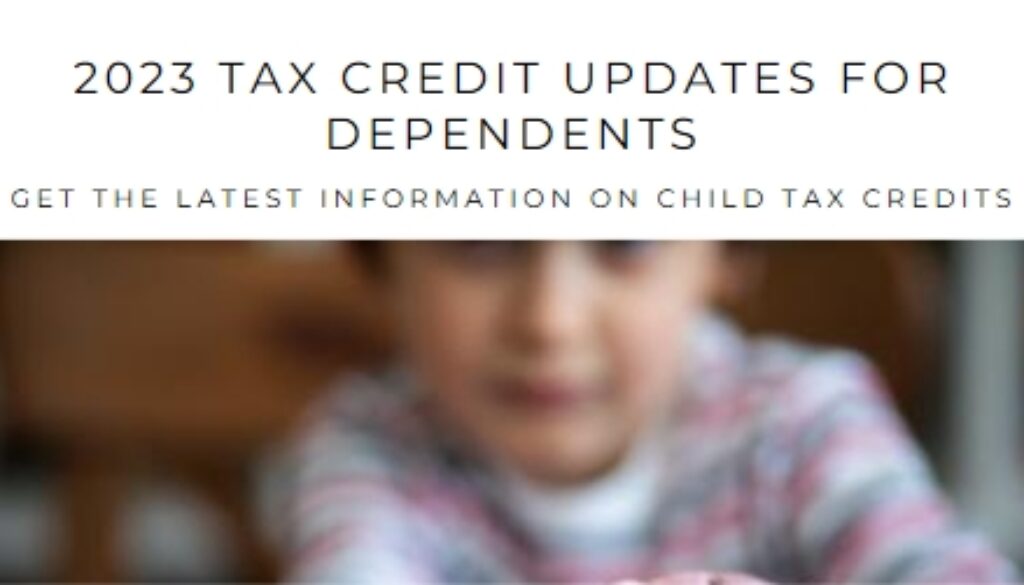2023 Updates on Tax Credits for Children and Other Dependents
2023 Updates on Tax Credits for Children and Other Dependents
The Child and Other Dependents Tax Credits are two of the most beneficial tax credits for families with children or other dependents. They can reduce your tax liability and increase your refund, depending on your income and filing status. However, these credits have undergone some changes in recent years, and you may be wondering what’s new with them for the 2023 tax year. Here’s a summary of the main changes and how they affect you.
What are the Tax Credits for Children and Other Dependents?
The Child Tax Credit (CTC) is a tax credit that you can claim for each qualifying child who is under 17 years old and has a valid Social Security number. The CTC can reduce your tax liability by up to $2,000 per child, depending on your income and filing status. The CTC is also partially refundable, which means you can get up to $1,600 per child as a tax refund even if you owe no tax. Need help filing your taxes?
Click here to Book an online appointment
The Credit for Other Dependents (COD) is a tax credit that you can claim for each qualifying dependent who is not a child under 17, such as an older child, a parent, a sibling, or a relative. The COD can reduce your tax liability by up to $500 per dependent, depending on your income and filing status. The COD is not refundable, which means you can only use it to lower your tax bill, not to get a refund.
What’s new with the Child and Other Dependents Tax Credits for 2023?
The Child and Other Dependents Tax Credits were temporarily expanded and enhanced for the 2021 tax year as part of the American Rescue Plan Act. The changes included:
- Increasing the maximum CTC amount to $3,000 per child ($3,600 for children under 6) and making it fully refundable.
- Sending monthly advance payments of the CTC to eligible families from July to December 2021, based on their 2019 or 2020 tax returns.
- Raising the income thresholds for phasing out the CTC and the COD, allowing more families to qualify for the full or partial credits.
- Extending the CTC to 17-year-olds and the COD to qualifying relatives who live with the taxpayer for more than half the year.
However, these changes were only for the 2021 tax year and expired at the end of the year. Unless Congress extends them, the Child and Other Dependents Tax Credits will revert to their previous rules and amounts for the 2022 tax year and beyond.
For the 2023 tax year, there is a new bipartisan bill that proposes to boost the Child and Other Dependents Tax Credits for the next three years. The bill, announced by Democratic Sen. Ron Wyden of Oregon and Republican House member Jason Smith of Missouri, would increase the maximum refundable amount of the CTC to $1,800 per child for 2023, $1,900 for 2024, and $2,000 for 2025, along with inflation adjustments. The bill would also provide tax breaks for businesses and simplify the tax code.
The bill is expected to benefit 16 million children and lift nearly half a million children out of poverty in the first year. However, the bill is less generous than the enhanced CTC that provided monthly checks to families and ended in 2021. The bill also faces uncertainty in Congress, as it may not get enough support from both parties.
How to claim the Child and Other Dependents Tax Credits for 2023?
To claim the Child and Other Dependents Tax Credits for 2023, you need to file a tax return and report your qualifying children and dependents on Form 1040, Schedule 8812, and other relevant forms. You also need to meet certain eligibility criteria, such as having a certain level of income, providing more than half of the support for your dependents, and living with them for more than half the year.
If you received advance payments of the CTC in 2021, you also need to reconcile them with the actual CTC amount that you are eligible for when you file your 2021 tax return. You may have to pay back some or all of the advance payments if they exceeded your actual CTC amount, or you may get an additional refund if they were less than your actual CTC amount.
Where to get more information and help?
The Child and Other Dependents Tax Credits can be complex and confusing, especially with the recent changes and the advance payments. If you need more information or help with claiming these credits, you can visit the IRS website or use a reputable tax software or professional service. You can also check out these helpful resources:
The Child and Other Dependents Tax Credits can make a big difference in your tax situation and your financial well-being. Make sure you understand the rules and claim the credits that you deserve.
Can You Deduct Your Car Lease Payments on Your Taxes?
My Business Web Space may earn an Affiliate Commission if you purchase something through recommended links in this article.
